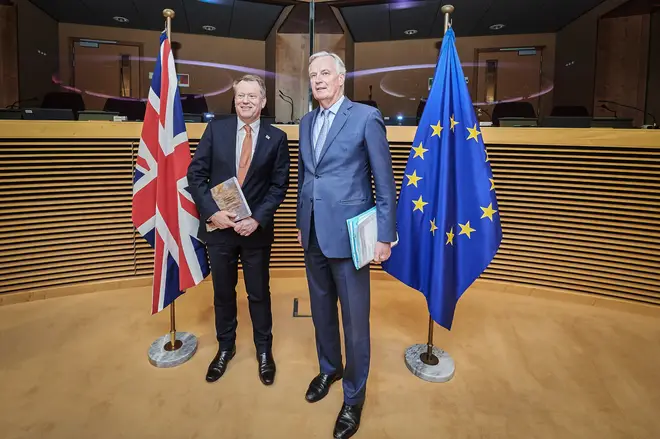
Tom Swarbrick 4pm - 6pm
23 July 2020, 12:10

The UK's chief Brexit negotiator has said Britain must "face the possibility" that a deal may not be reached, despite his hopes of finalising one in September.
Speaking after the latest round of negotiations with the EU, David Frost said "substantial areas of disagreement remain" in the talks.
Mr Frost said "considerable gaps remain in the most difficult areas" following the latest round of talks in London with EU negotiator Michel Barnier.
Mr Barnier said they had agreed to "intensify our discussions" after Boris Johnson stated three "red lines" - "no role for the European Court of Justice in the UK; the right to determine future UK laws without constraints; and an agreement on fisheries that shows that Brexit makes a real difference compared to the existing situation."
He also said the EU and UK have until "October at the latest" to strike a deal or risk the imposition of quotas and tariffs.
In a statement, Mr Frost said: “We have just concluded our latest round of negotiations with the EU. These were the first formal trade discussions to have taken place in London during these talks and were part of the intensified process agreed for July.
“It is unfortunately clear that we will not reach in July the “early understanding on the principles underlying any agreement” that was set as an aim at the High Level Meeting on 15 June.
Here is my statement at the end of the latest round of negotiations with the EU. https://t.co/IXDiuhucsB
— David Frost (@DavidGHFrost) July 23, 2020
“At that meeting, the Prime Minister set out once again the fundamental principles which we have repeatedly made clear would need to underpin any future agreement and which are intrinsic to the UK’s future as an economically and politically independent country. Any agreement needs to honour these principles in full.
“The EU’s proposals so far, while a welcome response to the Prime Minister’s statement, do not do so, and therefore substantial areas of disagreement remain.
“Specifically, the EU has listened to the UK on some of the issues most important to us, notably on the role of the Court of Justice, and we welcome this more pragmatic approach."
But Mr Frost said "considerable gaps" remain in the so-called level playing field and on fisheries.
He continued: “We have always been clear that our principles in these areas are not simple negotiating positions but expressions of the reality that we will be a fully independent country at the end of the transition period.
“That is why we continue to look for a deal with, at its core, a free trade agreement similar to the one the EU already has with Canada – that is, an agreement based on existing precedents. We remain unclear why this is so difficult for the EU, but we will continue to negotiate with this in mind.

Johnson: let's get on with Brexit
“Looking forward, there are large areas of convergence in many of the areas on which we are negotiating and ample precedents and texts on which we can base our work. We will keep working hard to bridge the gaps and find a way through.
“When the next round of negotiations begins there will be not much more than four months left until the end of the transition period.
“Although we will continue energetically to seek an agreement with the EU, we must face the possibility that one will not be reached, and we must therefore continue preparing for all possible scenarios for the end of the transition period at the end of this year.
“Despite all the difficulties, on the basis of the work we have done in July, my assessment is that agreement can still be reached in September, and that we should continue to negotiate with this aim in mind.
“Accordingly we look forward to welcoming the EU team back to London next week as planned for informal discussions and to the next negotiating Round beginning on 17 August.”
In a press conference following the talks, Mr Barnier said: "In June the Prime Minister Boris Johnson told us that he wanted to reach a political agreement quickly.
"The Prime Minister also stated three red lines.
"Number one; no role for the European Court of Justice in the UK.
"Number two; the right to determine future UK laws without constraints.
"Number three; an agreement on fisheries that shows that Brexit makes a real difference compared to the existing situation."
"What Boris Johnson writes and says matter to the EU.
"Therefore, following the high-level meeting we agreed to intensify our discussions.
"We have tried to understand how these three red lines can be squared with our commitment to a comprehensive new partnership as set out in the Political Deceleration signed by Prime Minister Johnson on 17 of October last year."
He said the EU had engaged "sincerely", adding: "Over the past few weeks the UK has not shown the same level of engagement and readiness to find solutions respecting the EU fundamental principles and interests."
Michel Barnier said the EU and UK have until "October at the latest" to strike a deal or risk the imposition of quotas and tariffs.
He said: "If we do not reach an agreement on our future partnership there will be far more friction.
"For instance, on trading goods, in addition to new customs formalities there will be tariffs and quotas.
"This is the truth of Brexit... and I will continue to tell the truth.
"If we want to avoid this additional friction we must come to an agreement in October at the latest so that our new treaty can enter into force on January 1 next year.
"This means that we only a few weeks left and that we should not waste it."